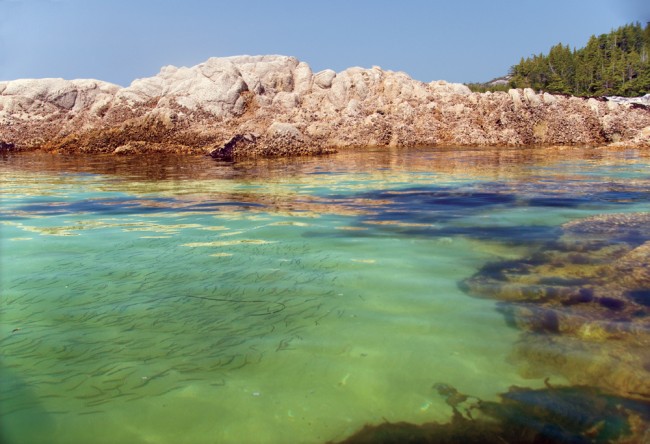
Photo Credit: Al Lehmann
Campania Island:The Beauty of Emptiness
The impermanence of being—the idea that everything that is, is nothing; or that nothing is what is—is central to Zen Buddhism. To Zen practitioners, it is the liberating recognition of this non-being that constitutes enlightenment.
Wilderness is an expression of this emptiness: the absence of idea, the absence of man. Perhaps that is why so many of us crave it, seek both to lose and to find ourselves in the mad mystery of the wild. As American naturalist John Muir said, “The clearest way into the universe is through a forest wilderness.”
Northern BC is still a variably accessible place where true wilderness can be found. Some of this wilderness is its offshore islands.
A few years ago I was privileged to be part of a group that voyaged on an old fishing boat, out through the mouth of the Douglas Channel to Campania Island. Campania is a rugged island just west of Gil Island, infamous site of the sinking of BC Ferries’ Queen of the North. Like most of BC’s islands, Campania consists largely of coastal mountains still thrusting above Pacific waters. The mountain rock is glacier-scarred and weathered by wind and water.
On its west coast, a long finger of fractured rock fringed with hardy evergreens extends southward, creating a sheltered inlet on the finger’s lea side. Here, within numerous coves stretch small beaches of fine white sand, sheltered enclaves tucked against the west flank of the island.
Behind the beaches lies tangled temperate rainforest, above and beyond which stretch rocky upper benches leading to the jumbled slopes of Mount Pender, a massive length of mountain ridge stretching more than 500 metres above sea level along the center of the island.
Ebb tide
Especially at low tide, a jagged rock garden emerges from the bottom of the channel near the shore, threatening to rip the bottom from any unwary vessel. Among these rocks thrives a wealth of sea-life: sea cucumbers, anemones, rockfish of bizarre aspect. As the tide ebbs lower we spot huge clusters of mussels fixed to the rocks. In the shallows along the shore race thousands of salmon fingerlings, whirling in schools like shadowy clouds, feeding on plankton.
Plant life, including mosses and tidal grasses, clings to cracks in the rocks near the shore, but tenacious dwarf evergreens assemble into rough forest crawling up the slopes of Mount Pender.
Light spangles everywhere, flashing off the water, reflecting off the rocks whitened by salty surf, nearly overpowering the capacity of my simple camera. My friends in kayaks wear dark glasses and Tilly hats, like explorer spies, with SLRs and field-glasses slung round their necks. Brightness is everywhere.
Strangely silent, gulls sail and circle, settling on rocks to examine us critically.
Refugees from civilization
Off to the west we can spy the rugged outline of the Estevan group of islands, beyond which stretches the vast Pacific. A lone sailboat edges down the channel, far offshore.
On the beach we note several large wolf tracks in the packed sand, paw prints four or five inches long. We examine the forest rim carefully, imagining sets of canine eyes silently watching from the gloom under the trees as we set up our colourful tents well above the high-tide line.
In rock-strewn coves along the shore we find old fishing floats (sometimes featuring Asian characters), reminders of man’s distant presence, washed ashore by passing tidal currents or storms raging from the big water to the west.
Refugees from civilization, we have brought it along nonetheless in the forms of bakery bread and various wines. At dinner on the boat we enjoy fresh coho, spinach salad and California chardonnay. In tribute to coastal delicacies, we also try sea cucumber (a bit rubbery, like calamari) cooked with pasta, and anemone roe, faintly peanut-tasting. We finish with coffee and dark chocolate. Dozing and chatting in the evening sunlight, one of us remarks that he is about to expire from a surfeit of satisfaction!
From far up the inlet sounds the racket of sandhill cranes, probably a breeding colony north of the inlet’s end. Breeding pairs engage in a kind of complex interchange of calls. A colony of possibly dozens of pairs emits a dizzying confusion of cackles that echoes to us off the mountain and over the water.
As the sun sinks lower we head for the beach and camp. Tide is low. We build a driftwood fire and sit watching the sky redden to rose and violet in the west. The cranes go quiet. A murrelet “plops” in the inlet. A dazzle of stars emerges overhead, spangling the darkening sky. Devoid of language, one by one we drift to our tents, leaving the last campers to douse the fire.
Still untouched
We roll into down bags, seeming utterly vulnerable in the vast darkness. A Zen emptiness of night enfolds the camp. Like a held breath, its beauty is nearly unbearable. Dreams of wolf packs and salmon caress away my tension, and I drift into a deeper oblivion.
Two days later, about to leave, we meet a couple that has kayaked north to Campania from Port Hardy. The man, smiling and weathered, confides that he came to Campania by kayak 25 years previously, and they have come back to see if the island is still “untouched.” We briefly exchange our joy that it is.
Perhaps the Zen masters are right: we cannot ever retain the experience of our lives’ moments because the moments always pass. However, the wilderness emptiness remains, for those who seek it for the first time or for those who seek to return. May it ever remain so.







I just came back from a boat trip to Campania Island and made a short video of the white sand beaches: https://www.youtube.com/watch?v=YJBpdwcFzb4
👤 Klaus Urbantke 🕔 May 11, 2015
Been looking for you, hopefully you get this note and get back in touch,
Gary Beattie
👤 Gary Beattie 🕔 Jul 10, 2015